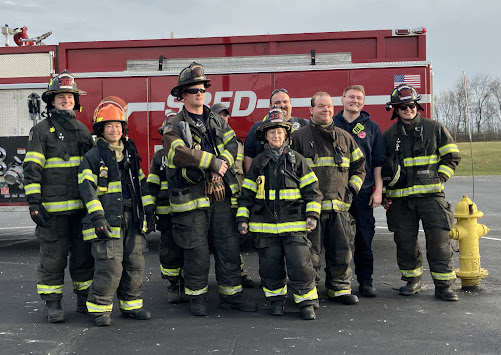New growth encouraged after prairie burn at Willowbrook Middle School

MARIANNE MUELLER PHOTO The Herald
South Beloit Fire Department was assisted with the prescribed burn by Boone County Fire Protection District #2 on April 10 at Birds Grove Prairie at Willowbrook Middle School.
Sunny skies and warm temperatures set the perfect scene as families set up camp on the grounds of Willowbrook Middle school the evening of April 10.
The South Beloit fire department rolled in to perform a prescribed controlled burn “Birds Grove Prairie” on the hillside, just east of the school.
In a matter of five minutes the prairie burned in a magnificent spectacle of flames and smoke.
This burn and others allow the breaking down of existing plant stalks to be turned into usable nutrients as well as to stimulate new plant growth going into the spring and summer season.
Prescribed fire helps to keep aggressive invasive species in check, which includes buck thorn, multi flora rose and honeysuckle while encouraging growth of native plants and supporting the regeneration of oak and\hickory, dominant trees of the Midwest.
The burn can control invasive plants and trees, fire can improve soil by recycling nutrients from charred plants. Many landscapes have also been shaped by flames , and some wildlife species have come to rely on fire to assist in their survival.
Another benefit of a prescribed fire is that it helps prevent wildfires from spreading and causing catastrophic damage. By getting rid of brush, leaf litter, and downed branches a controlled fire can reduce the amount of combustible material that might be found in a wildfire’s path.
A few examples of species that have evolved with fire and depend on habitats that a prescribed fire can help restore and support- Oak Woodlands, Red-headed woodpeckers, bees, Jack pines and Narrow-leaved purple cone flowers.
Wildlife is always of importance and taken into consideration during restoration work. Taking safety measure of protecting wildlife involves conducting burns on relatively small plots of land that any animals and birds are able to quickly run or fly away to a nearby safe area. Early spring and late fall are the seasonal times set to avoid mating and nesting seasons, and to ensure that smaller reptiles such as snakes and turtles are dormant and safely burrowed underground or beneath rocks or logs.
To prevent harm to people or wildlife, fire standards have been set by the National Wildfire Coordinating group. All staff and volunteer firefighters are trained to mitigate potential risks. They clear the ground to create firebreaks, or strips of bare soil. Which prevents flames from escaping the boundary of the area, and helps to keep burn crews safe.
“Birds Grove Prairie” is a place that holds strong historical ties.
This prairie is named after the original settlement that Stephen Mack had at the mouth of Dry Run, which is now known as Hononegah Forest Preserve.
Birds Grove history as written from the years of 1829-1835.
Stephen Mack and Hononegah fled from Grand Detour for good. They went up the river into present day Winnebago County and built a cabin in a Winnebago village at the present site of Hononegah Forest Preserve.
Mack’s sojourn there was peaceful until the outbreak of the war when a party of Black Hawk’s braves raided his cabin searching for his supply of gunpowder (which Mack succeeded to hide).
On May 9, 1832, Mack was run out of his cabin, and he and Hononegah fled to Chicago.
Edson Carr – Founder and publisher of the Rockton Herald relates a romance in which Mack met Black Hawk, and after the villagers advised Mack that they could not protect him, Mack took refuge on Webber’s Island and Hononegah provided him with food and freshwater daily until the threat was passed. Carr seems not to have believed the story, and modern research has also cast doubt on it.
On May 24, 1832 Mack enlisted in Captain John S.C. Hogan’s company of militia with the rank of 1st Sergeant. Mack’s company was too small to be an effectual military organization, and the only noteworthy event was when the company discovered the aftermath of the Indian Creek Massacre (which occurred on May 20) at the Davis home some 12 miles north of Ottawa where fifteen whites were slain.
By about the second week of June, army regulars from Michigan began arriving in Illinois to continue the war, and by mid-June Mack’s company of militia was dissolved.
By a treaty signed in Chicago by the Pottawatomie on Sept. 28, 1833, Mack received $600.00 on behalf of his three daughters (supporting the belief that Hononegah was part Pottawatomie). After the war Mack returned to his cabin to resume his trading operations.
Birds Grove Prairie’s history is now richer in its soil thanks to the South Beloit Fire department. They were assisted by Boone County Fire Protection District #2. This burn was said to be, “A great training opportunity for the department.”


